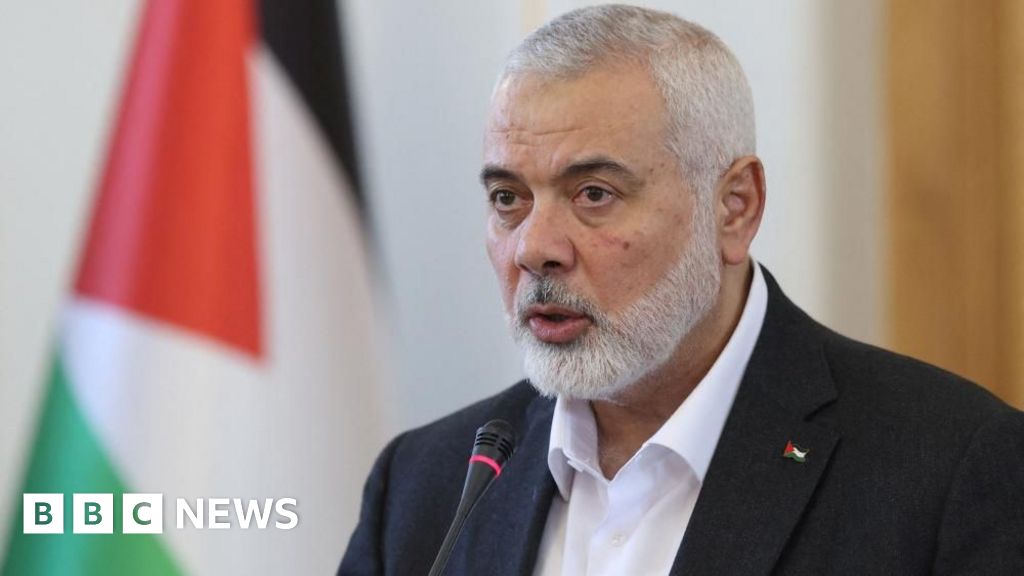Israel’s defense minister has acknowledged for the first time that Israel killed Hamas political leader Ismail Haniyeh in Tehran in July.
In his speech, Israel Katz vowed to target Yemen’s Iranian-backed Houthi leaders, who have been launching missiles and drones at Israel.
Haniya was killed in an attack believed to be carried out by Israel inside the building where he was staying in the Iranian capital.
Separately, Israeli Prime Minister Benjamin Netanyahu said some progress had been made toward a ceasefire agreement with Hamas in the Gaza Strip, but he could not say when an agreement would be reached.
The comments came after a senior Palestinian official told the BBC that negotiations between Hamas and Israel were 90% complete, but important issues remained.
In his speech, Katz said Israel would “violently attack” the Houthis and “decapitate” their leadership.
“Just as we did against Haniyeh, (Yahya) Sinwar and (Hassan) Nasrallah in Tehran, Gaza and Lebanon, we will do so in Hodeidah and Sana’a,” he said of Hezbollah and Hamas, all of whom were killed. Referring to the leaders, he said: this year.
Haniyeh, 62, is widely considered the overall leader of Hamas and played a key role in negotiations aimed at establishing a ceasefire in the Gaza Strip.
After the assassination, Hamas appointed Yahya Sinwar, a leader in the Gaza Strip and one of the chief architects of the October 7 attack, as the group’s overall leader.
Mr. Sinwar was killed by Israeli forces in a chance encounter in the Gaza Strip in October, and the organization is still selecting a new leader.
Meanwhile, Hassan Nasrallah was the leader of the Iranian-backed Lebanese organization Hezbollah. He was assassinated in Beirut in September as Israel dramatically escalated its military campaign against Hezbollah. Starting the day after the 7th, they engaged in daily cross-border gunfights with Hezbollah. October attack.
The Iranian-backed Houthi rebels, who control northwestern Yemen, began attacking Israeli and international ships in the Red Sea shortly after Israel began targeting Hamas in the Gaza Strip last October.
The group has vowed to continue until the end of the war in Gaza.
The Israeli military said on Saturday that an attempt to shoot down a projectile launched from Yemen failed and the missile landed in a Tel Aviv park. A Houthi spokesman said the group used hypersonic ballistic missiles to attack military targets.
Israel launched an offensive last week that it said were Houthi military targets, attacking ports and energy infrastructure in Yemen’s capital Sanaa. The United States and Britain are also attacking Houthi targets as part of operations to protect international shipping.
Hamas attacked Israel last October, killing about 1,200 people and taking 251 hostages.
In response, Israel launched a military operation to annihilate Hamas in the Gaza Strip, which lasted more than a year and killed 45,317 people, according to the Hamas-run Gaza Strip Health Ministry. .
Hamas officials said the figure included 58 people killed in Israeli attacks in the past 24 hours. Local medical officials said at least 11 people were killed in three airstrikes on the Almawasi area, which the Israeli military had designated as a “safe zone.” Israel said it was targeting Hamas fighters.
Israel announced on Monday that three soldiers were killed in the northern Gaza Strip.
Humanitarian and rights groups have warned of catastrophic conditions for civilians in Gaza.
Oxfam said on Sunday that just 12 trucks had distributed food and water in northern Gaza over the past two-and-a-half months, accusing the Israeli military of “deliberate delays and systematic obstruction.”
“In three of these cases, food and water were delivered to schools where people were evacuated, which were cleared within hours and shelling was carried out,” Oxfam added.
Israeli officials said the report “deliberately and inaccurately” ignored “the massive humanitarian efforts carried out by Israel in the northern Gaza Strip.”
Israel claims that certain shipments “including food, water and medical supplies” were sent to areas in northern Gaza, including Beit Hanoun, Beit Lahia and Jabalia, where Israeli forces have been conducting military operations for several months. claimed to be carrying out. They are targeting Hamas fighters who have regrouped there.
Oxfam’s report comes after human rights group Amnesty accuses Israel of committing genocide in Gaza, and Human Rights Watch (HRW) says Israel intentionally deprived Palestinian civilians in Gaza of access to adequate water. The announcement was made after accusing the government of committing an “act of genocide”.
Israel’s Foreign Ministry said Amnesty’s report was “completely false and based on lies,” while an Israeli Foreign Ministry spokesperson said Human Rights Watch was “once again spreading bloody slander.” …The truth is the exact opposite of HRW’s lies.”



